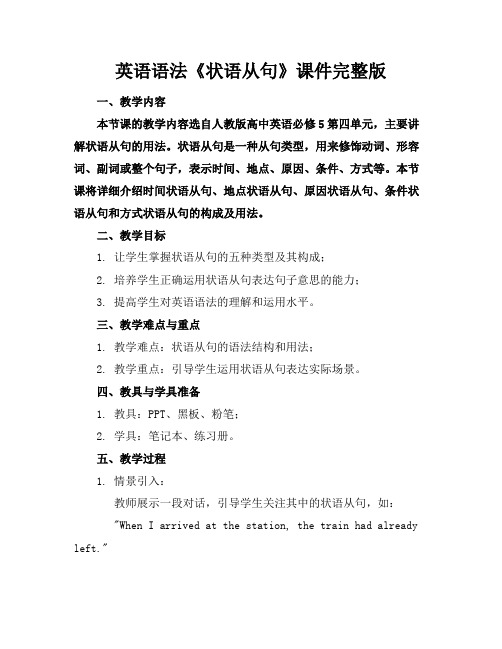高一状语从句5 - 学生版
高一英语状语从句

状语从句1. 时间状语从句常见的连词(组):when, while, as, before, after, once, till, until, as soon as, now that, hardly ...when, scarcely ...when, no sooner ...than等。
可以引导时间状语从句的副(介)词(短语)或名词短语:directly, instantly, immediately, by the time, the moment, the second, the minute, the instant, every time, each time, next time, the last time等。
注意点如下:(1) when, while, as引导的时间状语从句as表示“当……的时候”,往往和when/ while通用,但它着重强调主句与从句的动作或事情同时或几乎同时发生。
when(at or during the time)既可以表示在某一点的时候,又可以表示在某一段时间内,主句与从句的动作或事情可以同时发生也可以先后发生。
while强调一段时间,仅表示从句和主句的动作同时发生,并且有延续意义,该从句中的动词一般要用延续性动词,从句中常用过去进行时态或一般过去时态;当when表示a period of time 时,两者可以互换。
She came up as I was cooking.(同时)在我做饭时,她走了过来。
When we were at school, we went to the library every day.(在一段时间内)当我们在学校时,每天都去图书馆。
While they were watching TV, I was preparing myself for the coming examination.他们在看电视,而我在为即将到来的考试做准备。
高中英语 Module5 Grammar复习状语从句讲练 外研版必修5

GRAMMAR复习状语从句I. 选用方框内合适的连词填空(每个连词限用一次)。
1. ________ it is hard work, I enjoy it.2. I’ll writ e to you ________ I get to Beijing.3. ________ you are happy, it doesn’t matter what you do.4. ________ decision my father made I would support it.5. Tony has been sad ________ he got divorced.6. ________ you get there the meeting will have been over.7. My baby sister never cries ________ she is hungry.8. ________ anyone calls, tell them I’m not at home.9. We’ll have to finish the job, ________ long it takes.10. ________ she spoke I hadn’t realized she wasn’t English.II. 选用方框内合适的连词完成下面短文(每个连词限用一次)。
Eric jumped onto his bicycle as soon as he’d finished his homework. He thought about the whales 1. ________ he was riding off in the direction of the beach, He hoped he would see them again today.2. ________ he got to the beach, Eric hid his bicycle behind a bush3. ________ no one could see it from the road. The sky was already growing dark4. ________ it was only four in the afternoon. Eric was worried.5. ________ it rained, he wouldn’t be able to see the whales6. ________ they would stay in deeper water. He hurried along the beach towards the rocks. Suddenly, he felt a drop of rain on his head. “Oh, no!”he thought. “But now that I’ve come, I’ll wait7. ________ the whales appear!” Just then he saw a large shape on the beach. It was a young whale! The whale was so still that at first Eric thought it was dead. Then he saw its tail move weakly. He turned and ran through the rain as fast as he could back to his bicycle. He had to get help.8. ________ they got the whale back in the water soon, it would die and Eric couldn’t let that happen.参考答案GRAMMARI. 1. Even though 2. the moment 3. As long as 4. Whatever 5. ever since 6. By the time 7. unless 8. If 9. however 10. UntilII.1. while 2. After 3. so that 4. although 5. If 6. because 7. until 8. Unless。
高中状语从句讲解分享资料.pptx

结果
动作
方式
目的 原因
3
状语? 某个状态的程度
好 good
相当好 quite good
非常好 very good
4
可以作状语的有?
句子 短语 词
5
你必须把车停在这里。 You must park your car here. 你必须把车停在角落里。 You must park your car at the corner. 你必须把车停在人很少的地方。 You must park your car where there are few people.
44
结果状语从句: 主语 + 谓语 + so + adj./adv. + a/an+n.+that... 主语 +谓语 + such +(a/an) +adj. + n.+ that... “如此…以致于…”
45
He is __s_o___ poor ___t_h_a_t___ he can't buy a bike for his son.
(1)主句是肯定句时:主句是 肯定句时,从句也为肯定式 till/ until “直到......为止”
I will wait here till/ until you come back.
20
7.till; until ; not...until (2)主句是否定句时 not...until “直到......才......” I didn’t go to bed until my father came back.
28
3. __A_s__h_e_d_i_d_n_'_t _u_n_d_e_r_s_ta_n__d______ __E_n_g_l_i_sh__ (由于他不懂英语), he came back to China soon.
状语从句(高一)

He will not join us unless he changes his mind. Don’t trouble trouble unless trouble troubles you.
*注: 主从句的动作发生在将来时,则主句用将来时,
从句用一般现在时。(主将从现) e.g: If he arrives tomorrow, I will be waiting for him at the airport.
5.目的状语从句
引导目的状语从句的主要连词有: so that, in order that
(so) that --- 以便, 从句中常常使用一些情态动词,如:
can, could, may, might, should等 e.g: Let’s take the front seats (so) that we may see more clearly.
6.让步状语从句
引导让步状语从句的连词有:Although, though
*注:不能与but连用
Although, though ---虽然 although 和though 可以互换,
但although 常放在句首。
e.g: Although it was raining, the plane managed to take off.
e.g: As he is honest and modest, all his friends like him.
Since ---既然 因语气较弱, 常译为既然
e.g: Since everybody has come, we can set off. Since the purser(事务长) didn’t tell us what to do,
高中英语状语从句讲解课件(共60张PPT)

After you use plastic bags, you mustn’t throw them about. 用过了塑料袋之后,不准到处乱扔。
连接词before的小结:
1. We had sailed four days and four nights before
I thought of it just _w_h__e_n_/a_s___you opened your mo主ut从h.句--几乎同时发生的短暂性动作
Things are getting better and better __a_s__ time goes on.正在发展变化的情况, “随着”
*就在那时,正在这时=and at this /that time
1) They were walking down the street when they saw
an accident. (A=B)
2) I was about to go swimming when our guide stopped
e.g. I will give you an answer immediately I finish my work.
4.句型类:no sooner…than…, hardly/scarcely… when…, etc. (一…就…)
e.g .Scarcely had he gone when she appeared.
D. will; finish
时间状语从句中用一般现在时代替一般将来时,用 一般过去时代替过去将来时
主句表示的是一个短暂性动作,
He fell asleep __w_h_e_n_/_w_h_i_le_/_a_she was reading.从句表示的是一个持续性动作
高中英语状语从句用法解析(含练习和答案)

高中英语状语从句用法解析英语语法状语从句类型综述状语从句主要用来修饰主句或主句的谓语。
一般可分为九大类,分别表示时间、地点、原因、目的、结果、条件、让步、比较和方式。
尽管种类较多,但由于状语从句与汉语结构和用法相似,所以理解和掌握它并不难。
状语从句的关键是要掌握引导不同状语从句的常用连接词和特殊的连接词即考点。
现分别列举如下:1.时间状语从句常用引导词:when, as, while, as soon as, while, before, after, since , till, until特殊引导词:the minute, the moment, the second, every time, the day,the instant, immediately , directly, no sooner … than, hardly …when, scarcely … whenI didn’t realize how special my mother was until I became an adult.While John was watching TV, his wife was cooking.The children ran away from the orchard(果园) the moment they saw the guard.No sooner had I arrived home than it began to rain.Every time I listen to your advice, I get into trouble.2.地点状语从句常用引导词:where特殊引导词:wherever, anywhere, everywhereGenerally, air will be heavily polluted where there are factories.Wherever you go, you should work hard.3.原因状语从句常用引导词:because, since, as, since特殊引导词:seeing that, now that, in that, considering that, given that, considering that, inasmuch as, insomuch asMy friends dislike me because I’m handsome and successful.Now that everybody has come, let’s begin our conference.The higher income tax is harmful in that it may discourage people from trying to earn more.Considering that he is no more than 12 years old, his height of 1.80 m is quite remarkable.4.目的状语从句常用引导词:so that, in order that特殊引导词:lest, in case, for fear that,in the hope that, for the purpose that, to the end thatThe boss asked the secretary to hurry up with the letters so that he could sign them.The teacher raised his voice on purpose that the students in the back could hear more clearly.5.结果状语从句常用引导词:so … that, so… that, such … that,特殊引导词:such that, to the degree that, to the extent that, to such a degree that,He got up so early that he caught the first bus.It’s such a good chance that we must not miss it.To such an degree was he excited that he couldn’t sleep last night.6.条件状语从句常用引导词:if, unless,特殊引导词:as/so long as, only if, providing/provided that, suppose that, in case that, on condition thatWe’ll start our project if the president agrees.You will certainly succeed so long as you keep on trying.Provided that there is no opposition, we shall hold the meeting here.7.让步状语从句常用引导词:though, although, even if, even though特殊引导词:as(用在让步状语从句中必须要倒装),while ( 一般用在句首),no matter …,in spite of the fact that, while, whatever, whoever, wherever, whenever, however, whicheverMu ch as I respect him, I can’t agree to his proposal.尽管我很尊敬他,我却不同意他的建议。
英语语法《状语从句》课件完整版

英语语法《状语从句》课件完整版一、教学内容本节课的教学内容选自人教版高中英语必修5第四单元,主要讲解状语从句的用法。
状语从句是一种从句类型,用来修饰动词、形容词、副词或整个句子,表示时间、地点、原因、条件、方式等。
本节课将详细介绍时间状语从句、地点状语从句、原因状语从句、条件状语从句和方式状语从句的构成及用法。
二、教学目标1. 让学生掌握状语从句的五种类型及其构成;2. 培养学生正确运用状语从句表达句子意思的能力;3. 提高学生对英语语法的理解和运用水平。
三、教学难点与重点1. 教学难点:状语从句的语法结构和用法;2. 教学重点:引导学生运用状语从句表达实际场景。
四、教具与学具准备1. 教具:PPT、黑板、粉笔;2. 学具:笔记本、练习册。
五、教学过程1. 情景引入:教师展示一段对话,引导学生关注其中的状语从句,如: "When I arrived at the station, the train had already left.""If you need any help, please don't hesitate to ask me."让学生分析这些状语从句的类型和用法。
2. 知识讲解:教师运用PPT展示状语从句的五种类型,分别为:a) 时间状语从句:如when, after, before, as soon as等;b) 地点状语从句:如where, wherever, in which等;c) 原因状语从句:如because, since, as等;d) 条件状语从句:如if, unless, until等;e) 方式状语从句:如as, as if, as though等。
教师举例讲解每种状语从句的构成和用法,让学生进行随堂练习。
3. 例题讲解:教师展示一些状语从句的例题,如:"I will go to the party if I finish my work.""He waited for her in the hall, wherever she might be."让学生分析这些例题的状语从句类型和用法,并进行小组讨论。
高中英语状语从句讲解及练习精编版

高中英语状语从句讲解及练习公司内部编号:(GOOD-TMMT-MMUT-UUPTY-UUYY-DTTI-状语从句状语从句在句中作状语,可分为:时间、条件、让步、原因、目的、结果、比较、地点、方式状语从句。
一、时间状语从句引导时间状语从句的连词有:when, as, while, until, not…until, before, after, since, the minute, the moment, each( every, next, the first) time等。
时间状语从句中一般用一般现在时或一般过去时。
1.When , while, as都可解释为“当```的时候”但侧重点有所不同。
1)WhenEg: When I arrived home , I had a little rest.注意点:when 从句的主语与主句主语相同,谓语动词是be 动词时,从句主语和be可以省略。
Eg: When (she was) walking along the street, she met her class teacher.2)AsAs 除了表示“当```的时候”,还可表示为“一面```一面”,“随着”Eg: He sang as he danced.(一面```一面)You will grow wiser as you grow older.(随着)3)While表示“当```的时候”强调主句的动作和从句的动作同时发生,从句一般用进行时,从句动词必须是延续性动词。
Eg: While we were working, they were having a rest.While (they were) having a discussion, they got very confused.注意点:while 有对比的含义,解释为“然而”。
eg: I prefer black tee, while he likes coffee.2.until, not…until表示“直到```才”,在肯定句中主句常用延续性动词;在否定句中主句常用短暂性动词。
- 1、下载文档前请自行甄别文档内容的完整性,平台不提供额外的编辑、内容补充、找答案等附加服务。
- 2、"仅部分预览"的文档,不可在线预览部分如存在完整性等问题,可反馈申请退款(可完整预览的文档不适用该条件!)。
- 3、如文档侵犯您的权益,请联系客服反馈,我们会尽快为您处理(人工客服工作时间:9:00-18:30)。
1、He was about to tell me the secret ______ someone patted him on the shoulder.
A、as
B、until
C、while
D、when
2、Hard-working though he was, ________ there was never enough money to pay the bills.
A、/
B、and
C、but
D、therefore
3、I shall be surprised if he does this the same way ________ I do.
A、as
B、like
C、which
D、what
4、It’s wrong for you to follow ________ they say.
A、no matter what
B、whatever
C、no matter which
D、whichever
5、—Does Lucy enjoy singing?
—Yes, she does. ________, I have never seen anyone else that is as enthusiastic about singing as she is.
A、As long as I have traveled
B、Now that I have traveled so much
C、Much as I traveled
D、As I have traveled so much
6、How can they learn anything ________ they spend all their spare time watching TV?
A、where
B、when
C、while
D、but
7、They went on working _________ it was late at night.
A、even if
B、as if
C、however
D、as though
8、______ I know the money is safe, I shall not worry about it.
A、Even though
B、Unless
C、As long as
D、While
9、We must work hard at school ________we can enter a good college.
A、so as to
B、so that
C、so
D、in order to
10、Take your raincoat in case it __________.
A、rains
B、should rain
C、rain
D、A, B and C
11、—Was his father strict with him when he was at school?
—Yes. He had never praised him ______ he became one of the top students in his grade.
A、after
B、unless
C、until
D、when
12、_______ had the thief escaped from the spot ________ he was caught.
A、No sooner;that
B、Hardly;then
C、Not only;but
D、Neither;nor
13、We keep milk in a refrigerator ________ it will not spoil.
A、until
B、in case
C、so that
D、when
14、________ I saw her, I knew she was a warm-hearted woman.
A、Though
B、The moment
C、As
D、after
15、One of the successful people’s strong points is that they can succeed ________ others fail.
A、if
B、when
C、how
D、where
16、We were told that we should follow the main road ______ we reached the central railway station.
A、whenever
B、until
C、while
D、wherever
17、-What was the party like?
-W onderful. It’s years _______I enjoyed myself so much.
A、after
B、when
C、before
D、since
18、________you are so weak, you’d better stay at home.
A、Since
B、For
C、Because
D、Though
19、_______you’ve got a chance, you might as well make full use of it.
A、Now that
B、After
C、Although
D、As soon as
20、It gave him such a shock ________ his face turned white.
A、that
B、as though
C、although
D、while
21、You can still find bones of the birds ________ they used to live.
A、in which
B、in the place
C、where
D、that
22、This photo of mine was taken ________ stood the famous Eastern Bright Pearl in Shanghai.
A、in which
B、which
C、there
D、where
23、He is as tall as___________.
A、I
B、me
C、my
D、A and B
24、______, I have never seen anyone who’s as capable as John.
A、As long as I have traveled
B、Now that I have traveled so much
C、Much as I have traveled
D、As I have traveled so much
25、As ________ as I know, there isn’t anyth ing left to eat.
A、soon
B、many
C、far
D、long
26、_______the day went on, the weather got worse.
A、With
B、Since
C、While
D、As
27、He seemed to have been asleep, so I said nothing, but sat ________ he would see me ________ waking.
A、whether; when
B、that;when
C、which;where
D、where;when
28、________ you begin the work, you must carry it out through to the end.
A、When
B、Though
C、Even if
D、Once
29、—Did you remember to give Mary the money you owed her?
—Yes. I gave it to her ______ I saw her.
A、While
B、the moment
C、suddenly
D、once
30、He is going ________ you went last week.
A、where
B、wherever
C、when
D、in the place。
